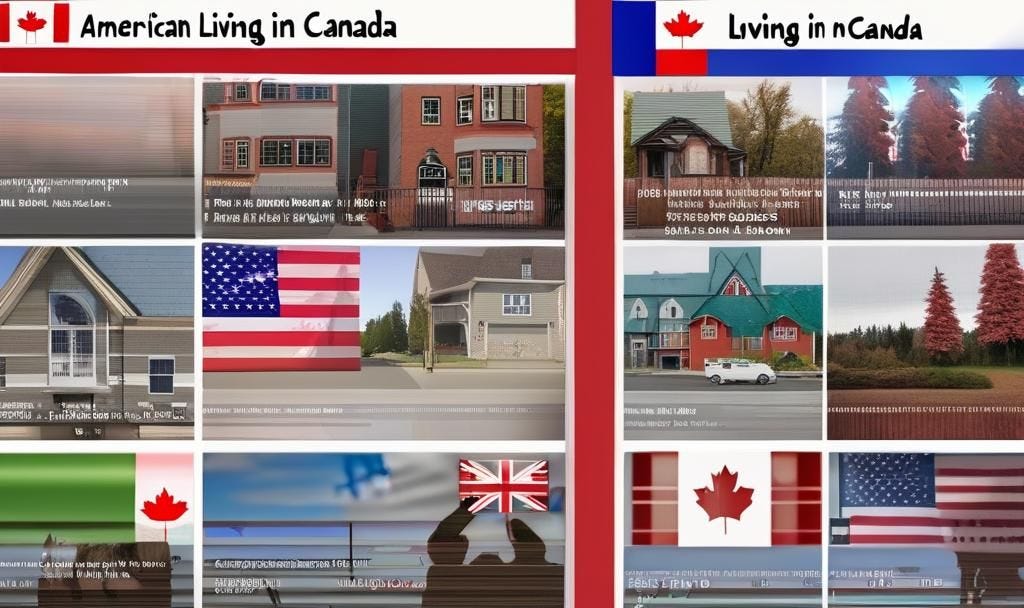Why Fewer Americans Are Moving to Canada After the 2024 Election
Because Canada has its own issues.
Why Fewer Americans Are Moving to Canada After the 2024 Election
In the wake of Donald Trump’s return to the presidency in 2024, social media platforms initially surged with searches and posts about Americans contemplating a move to Canada. This mirrored a similar trend in 2016 when Trump was first elected, sparking widespread conversations about relocating north. However, as the days pass, the buzz appears to be fading. While interest in relocating spiked after the election results, the reality is that most Americans are likely to adapt to the new political climate rather than uproot their lives entirely.
Political reactions to the 2024 election have also followed familiar patterns. Recount efforts are underway in counties and states where Kamala Harris lost, aimed at uncovering potential discrepancies or understanding voter behavior in critical regions. Protests and declarations of resistance against Trump’s administration have resurfaced, echoing strategies seen during his first presidency. Yet despite these movements, the overarching sentiment suggests most Americans are looking for ways to navigate this political reality without leaving the United States altogether.
But is moving to Canada still a viable solution for those disillusioned with America’s current political landscape? Let’s explore the realities of emigration, drawing from my observations and insights into the challenges and opportunities awaiting those considering this major life change.
Personal Encounters: Americans Who Made the Move
From my own experience, the number of Americans successfully transitioning to life in Canada seems limited. Despite recurring media narratives about mass migrations during contentious elections, I’ve only encountered two individuals who secured Canadian citizenship.
A Job Interview Encounter:
One individual I met during a hiring process shared his journey to becoming a Canadian resident. After John Kerry’s loss in the 2004 U.S. presidential election, he moved to one of Canada’s Maritime Provinces. His transition involved significant adjustments, including adapting to a slower pace of life, cultural differences in media and marketing, and distinct demographic characteristics compared to his home state. He was candid about the challenges but also emphasized how proper preparation and a willingness to adapt were critical to his success.A Casual Encounter at Home Depot:
Another individual, originally from Philadelphia, struck up a brief conversation with me when he noticed my parents’ New Jersey license plate. Although our exchange was short and lacked detail, his presence was a reminder that some Americans do make Canada their home. However, encounters like these are rare and often anecdotal.
Beyond these personal experiences, I’ve observed questions about moving to Canada arise in online forums like Reddit. One memorable post featured a Californian couple considering my city as their future home. Their reasons for leaving the U.S. included concerns about their interracial marriage and the belief that Canada could offer reduced healthcare costs. However, forum participants were quick to clarify the challenges they might face, including Canada’s high cost of living, limited housing affordability, and difficulty securing employment. These discussions highlight a common thread: the grass isn’t always greener on the other side.
Why I Chose Canada Over Returning to the U.S.
As an American and Canadian citizen, I’ve lived outside the United States for over a decade and ultimately decided to settle in Canada instead of returning. My decision wasn’t made lightly and was influenced by several factors:
Simpler Immigration Pathways:
Canada offered a more streamlined immigration process for my spouse compared to the complex and often unpredictable U.S. system.Healthcare Needs:
While Canada’s healthcare system has its shortcomings, it provides a more accessible option for addressing my son’s medical needs without the financial burden of the U.S. healthcare system.Political Polarization:
The increasing political divisions in the U.S., particularly the rise of Trumpism, made me prioritize stability and predictability over returning to familiarity.
These reasons, coupled with strained relationships with some American relatives, solidified my decision to build a new life in Canada. The move wasn’t without its challenges, but it felt like the best option for my family’s future.
A Recent Trip to the U.S.
Last month, I traveled to the U.S. to support my father during a complex and urgent surgery. This trip coincided with the 2024 elections, adding a layer of tension to an already stressful time. Despite the challenges, I made sure to submit my early voting ballot before leaving, although my last U.S. address in New Jersey meant my vote would likely lean toward Kamala Harris regardless.
During the flight back to Canada, I thought I saw an old high school classmate traveling with their family. While I didn’t approach them, it made me wonder if they were visiting Canada for vacation or exploring it as a potential place to relocate. The sighting was a stark reminder of how much time had passed since I lived in the U.S., and how different my path had become compared to many of my peers.
The Challenges of Moving to Canada
While moving to Canada may seem like an appealing escape, the process is far from simple. Canada, like any other country, has its own set of challenges:
Healthcare Isn’t Free:
Canada’s healthcare system, while publicly funded, doesn’t cover everything. Out-of-pocket expenses for medications, dental care, and vision services can add up. Additionally, long wait times for specialized care remain a significant issue.High Taxes:
From sales taxes to income taxes, Canada’s tax burden is much higher than in the U.S. This can quickly erode savings and disposable income.Expensive Housing:
Canada’s housing market is notoriously unaffordable, especially in major cities. Unlike the U.S., Canada lacks 30-year fixed-rate mortgages, leaving homeowners more exposed to market volatility.Employment Barriers:
Finding work in Canada can be challenging, especially for newcomers. Many employers undervalue international experience, and building a professional network from scratch takes time and effort.Driving and Credit Issues:
Americans moving to Canada often underestimate the cultural differences, from subtle social norms to significant lifestyle changes. These differences can be both exciting and overwhelming. U.S. driver’s licenses and credit histories don’t always transfer seamlessly. Some provinces require additional tests or documentation, and rebuilding credit in Canada can take time.
Immigration Pathways for Americans
If you’re serious about making the move, it’s essential to understand Canada’s immigration pathways:
Express Entry: A fast-track program for skilled workers, with applications processed in as little as six months.
Provincial Nominee Program (PNP): For individuals with ties to specific provinces.
Family Sponsorship: For those with Canadian relatives who can sponsor their application.
Caregiver Program: Designed for individuals providing care for children, the elderly, or those with medical needs.
Atlantic Immigration Program (AIP): For those living, studying, or working in Atlantic Canada.
Start-Up Visa: For entrepreneurs planning to launch businesses in Canada.
Agri-Food Pilot: For workers in agriculture and related industries.
Once you’ve secured permanent residency, becoming a Canadian citizen requires meeting several criteria:
Living in Canada for at least 1,095 days within the past five years.
Filing taxes for three out of five years.
Proving language proficiency in English or French.
Passing a citizenship test on Canadian history, geography, and government.
Taking the oath of citizenship.
Final Thoughts
While Canada may seem like an attractive destination for Americans dissatisfied with the political situation in the U.S., it’s essential to approach the decision with realistic expectations. Moving to another country is a significant life change, requiring financial preparedness, adaptability, and a willingness to navigate challenges.
If you’re considering the move, research all aspects of life in Canada, connect with local communities and build a clear financial and logistical plan. Emigrating is a life-altering choice, and making it for the right reasons can lead to a more fulfilling and stable future.










Bc there isn’t enough money left over for us “little guys!”
Great information. Thank you so much